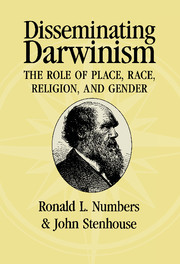Book contents
- Frontmatter
- Contents
- List of contributors
- Acknowledgments
- Introduction
- 1 Science, region, and religion: the reception of Darwinism in Princeton, Belfast, and Edinburgh
- 2 Darwin down under: science, religion, and evolution in Australia
- 3 Darwinism in New Zealand, 1859–1900
- 4 Environment, culture, and the reception of Darwin in Canada, 1859–1909
- 5 Darwinism in the American South
- 6 Darwinism, American Protestant thinkers, and the puzzle of motivation
- 7 Exposing Darwin's “hidden agenda”: Roman Catholic responses to evolution, 1875–1925
- 8 American Jewish responses to Darwin and evolutionary theory, 1860–1890
- 9 Black responses to Darwinism, 1859–1915
- 10 “The irrepressible woman question”: women's responses to evolutionary ideology
- Index
3 - Darwinism in New Zealand, 1859–1900
Published online by Cambridge University Press: 06 July 2010
- Frontmatter
- Contents
- List of contributors
- Acknowledgments
- Introduction
- 1 Science, region, and religion: the reception of Darwinism in Princeton, Belfast, and Edinburgh
- 2 Darwin down under: science, religion, and evolution in Australia
- 3 Darwinism in New Zealand, 1859–1900
- 4 Environment, culture, and the reception of Darwin in Canada, 1859–1909
- 5 Darwinism in the American South
- 6 Darwinism, American Protestant thinkers, and the puzzle of motivation
- 7 Exposing Darwin's “hidden agenda”: Roman Catholic responses to evolution, 1875–1925
- 8 American Jewish responses to Darwin and evolutionary theory, 1860–1890
- 9 Black responses to Darwinism, 1859–1915
- 10 “The irrepressible woman question”: women's responses to evolutionary ideology
- Index
Summary
In 1860 Samuel Butler, a young Englishman later famous as a novelist, sailed into Lyttelton harbor with the Bible and The Origin of Species in his baggage, leaving far behind an angry clergyman father and the Anglican Establishment. Within two years, Butler, now a high-country farmer, began enlightening New Zealanders on the merits of Darwin's theory. His first article, published in The Press of Christchurch, presented a dialogue between free thinker “F,” an ardent Darwinian speaking for Butler himself, and “C,” a devout and simple-minded Christian, who found evolution “horrid” and “utterly subversive of Christianity.” Free thinker attempted to enlighten Christian by pointing out that illustrations of evolution could be observed everywhere in New Zealand. For example, the competition within a population of wild cats on sheep stations such as Butler's own Mesopotamia illustrated Darwin's struggle for life. Competing with one another for a diminishing supply of quail, only the fittest cats survived.
The Reverend C. J. Abraham, the Anglican bishop of Wellington, writing under a pseudonym, picked up the gauntlet that Butler had thrown down. As far as he was concerned, the Origin of Species, which he had recently read, simply rehashed the speculations of earlier writers such as Erasmus Darwin. “Were it not for their supposed effect upon religion,” Abraham declared, “no one would waste his time in reading about the possibility of polar bears swimming about and catching flies so long that they at last get the fins they wish for.”
- Type
- Chapter
- Information
- Disseminating DarwinismThe Role of Place, Race, Religion, and Gender, pp. 61 - 90Publisher: Cambridge University PressPrint publication year: 1999
- 11
- Cited by

